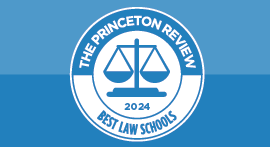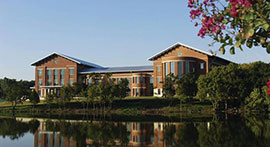Overview
Test Scores
(enrolled students)
Deadlines
Application Process
Other Admission Factors
LSAT Score
Undergraduate GPA
Letters of Recommendation
Essay / Personal Statement
Selectivity Rating
Faculty Information
Students Say
“The classrooms and facilities are phenomenal.” Class attendance policies are “relatively stringent.” It’s a good thing, then, that the academic atmosphere is generally “excellent.” “The great thing about LSU Law professors is that many of them have been incredibly influential in the development of Louisiana law,” observes a 1L. “In preparing cases for classes, you can’t help but notice how often the courts have relied on your professor’s doctrinal works in formulating their decisions.” “While some are intent on using the Socratic Method at all costs, most use it simply to ensure that you are paying attention and can answer their questions when called upon,” relates a 3L. Not all faculty members are fabulous, though. “LSU has some of the best,” advises a 2L, “but a couple have to be the worst.” Outside of class, most faculty members are “more than willing to talk to students.” “They are all accessible if you try a little bit.” A few students tell us that the administration “emphasizes bureaucracy,” but the overwhelming sentiment here is that top brass “truly works for the students” and is “remarkably responsive to the student body.”
LSU Law offers “an abundance of opportunities to be involved” in journals and advocacy programs. There are clinical programs in immigration law, family law, mediation, homeless advocacy, parole reentry, and juvenile representation. “A well-connected externship program places secondand third-year students with justices and judges in the Louisiana Supreme Court and the U.S. Fifth Circuit Court of Appeals, among others,” adds a 3L. A study abroad program in Lyon, France, is also popular. Over 150 employers recruit here each year, but opinion regarding LSU Law’s ability to help students find jobs is split. Critics tell us that the Career Services office displays “callous indifference toward students who are not in the top five to ten percent of the class.” Other students say that Career Services is “in touch with you from the beginning” and “goes the extra mile to help students and find opportunity for them.” “This school does everything it possibly can to ensure that you pass the bar and get a job,” beams a confident 1L.
Career overview
Career Services
Graduates Employed by Area
Graduates Employed by Region
Prominent Alumni
Dates
Expenses per Academic Year
Student Body Profile
Demographics
Campus Life
Students Say
“Social life at LSU Law is great from the library to the tailgate.” This school is “in the middle of Cajun country—great food, one of the best football teams in the nation, and good Southern people.” “LSU is in the greatest location a student could ask for,” gloats a 1L. “Baton Rouge is an amazing city, and the Law Center is located in the heart of one of the most vibrant undergraduate campuses in the nation.” “There are many social programs running throughout the semester so that you get to know your classmates personally and you aren’t just doing law school 24/7.” “There are parties all the time.” “There are free drinks nearly every weekend.” “Intramural tournaments” are pretty popular, too. “Students strap on pads and play a charity football game once a year,” just for instance, complete with tackling.
More Information
Admissions Office Contact
Admissions Director
Baton Rouge, LA 70803



